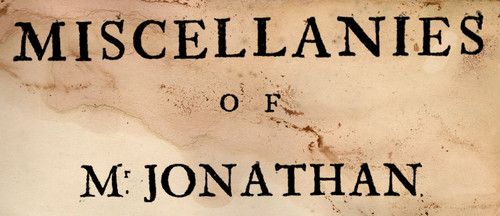
unearths some literary gems.
From Marginalia: Readers Writing in Books, by H. J. Jackson:
***
The word itself, which Coleridge may well have used ironically to make light of his own pretensions, has stuck: readers seem to find that its Latinity confers a degree of seriousness and erudition that 'notes,' 'remarks,' 'comments,' and even 'annotations' lack.
[Or, as I wrote myself many years ago in The Quotable Jonathan Caws-Elwitt, "The lay reader might not recognize the drunken, illegible scrawlings that deface the text as the cryptic, inebriated marginalia that attract the true scholar."]
***
[A nineteenth-century child, in the course of asserting ownership of a book by writing her name in it, shows a sophisticated conception of the universe as a vacuum that compensates for her uneven grasp of geography.]
"Ann Owen Hay | Hadley | Barnet | Middlesex | England | Great Britain | Europe | P. Ocean [sic] | World | Air | Nothing."
[No turtles!]
***
[Pre–Digital Era Cultural Scapegoats dept.: In a work called The Library from 1781, poet George Crabbe blamed, among other factors, "publication in parts...and light reading for a general loss of concentration and readerly stamina."]
***
[Coleridge] might simply have been carried away by the momentum of his sentence....
[Hey, it happens to the best of us.]
***
[From a very specialized ad hoc notation system that Coleridge created to criticize passages written by Southey.]
"N. means Nonsense."
***
Grafton describes a "raft of editions" of major and minor classical authors published between 1650 and 1730, "in all of which the voices of the arguing commentators threatened to drown the thin classic monotone of the original text."
***
[Speaking of blank books.]
[Kenneth Grahame] whimsically spoke up for "the absolute value of the margin itself" and wondered when the world might hope for "a book of verse consisting entirely of margin."
[In an unrelated passage, Jackson describes preliterate children's encounters with books as "seeing only blanks in books."]
***
The relationship between book and reader may be as fraught as any close human relationship, with the special frustration of one partner's being insensate and unchangeable.
[Except if it's The Young Wizard's Hexopedia, of course. (:v>]
***
By "author" here and hereafter I normally mean not the actual writer but Wayne Booth's "implied author"--the person inferred from the text on the page, the one we have seen annotators address as "you."
[I once did some kind of gag involving "the author" vs. "the writer," but I didn't realize that in Theoryland, this was actually a thing! But of course it is.]
***
[A bit of a Coleridge marginalium, written in response to a Wordsworth marginalium.]
"I can by no means subscribe to the above pencil mark of W. Wordsworth...."
***
But [Coleridge] was still nimble mentally, and in his notes he gives constantly the impression of someone running upstairs taking the steps two at a time.
***
The British Library copy of Richard Clark's Reminiscences of Handel, extra-illustrated by the author... is--not to put too fine a point on it--the work of a nutter; but it represents the Victorian love of trivial particulars and is in any case a captivating monument to the intractability of folly.
***
[Joanna Southcott] died in 1814, having literally failed to deliver--she announced herself, in her sixties, as about to give birth to Shiloh, the promised "man-child" of the Book of Revelation, but he never appeared....
***
Alfred Russel Wallace's Contributions to The Theory of Natural Selection (1870).... is a varied collection of essays on natural history; it contains one, for instance, titled "The Philosophy of Birds' Nests."
***
There may well be rare-book collections that would show a book the door if they found a note in it.
[I just like the image of a book being "show[n] the door" by a collection of books.]



